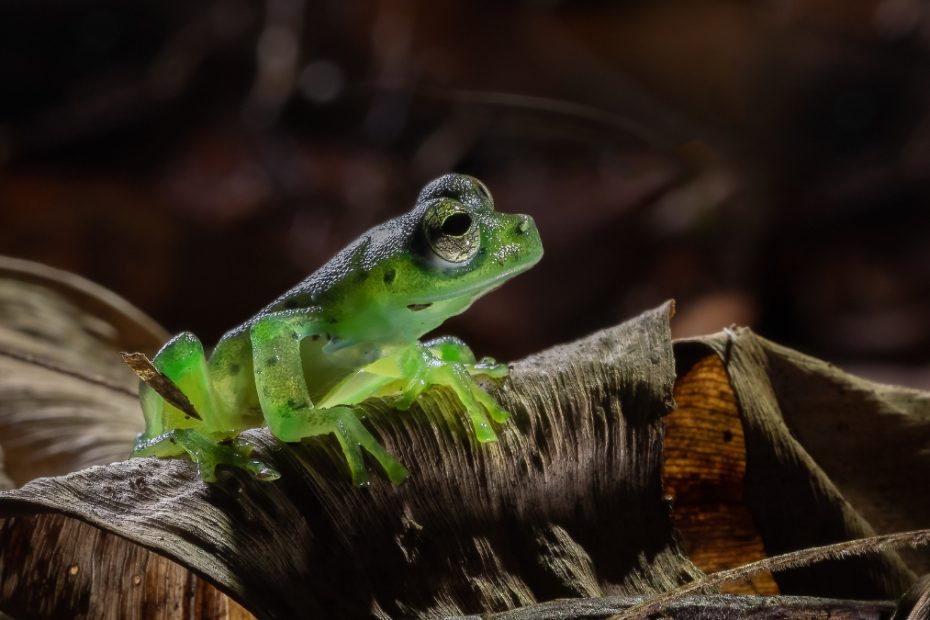The fascination with glass frogs isn’t a new thing among frog owners or researchers. However, those who aren’t well accustomed to frogs get very intimidated by glass frogs.
One common question among these people is, are glass frogs poisonous? Simply put, glass frogs are not poisonous. They don’t have any toxins that could harm people or other animals. In fact, they’re considered pretty safe and can make great pets if you can provide for them.
Keep on reading as we tell you more about the misconception of glass frogs being poisonous. Additionally, we will tell you about any harms associated with glass frogs. We will also talk about the poisonous frogs to avoid any confusion you may have.
Are Glass Frogs Poisonous?
Glass frogs are typically considered very safe. These tiny frogs, native to Central and South America, barely have any features that could be a threat. As of yet, we have very little, almost close to no research, research that confirms the question of whether glass frogs are poisonous.
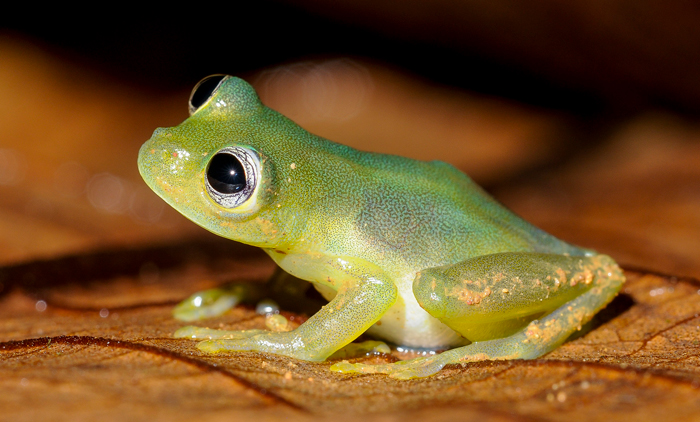
Unlike a lot of other frog species, they don’t release toxins as a defense mechanism. Neither do they have poisonous skin that can harm humans. In fact, these frogs are very delicate and somewhat puny. This further adds to their harmless characteristics.
Moreover, instead of harming people, these frogs contribute to human medicine. Research has shown these frogs assist in hematology, which can help humans with blood clotting.
The general misconception is that glass frogs are poisonous. This is due to the lack of knowledge and fear of exotic animals. You must understand not all exotic frogs are poisonous or harmful in other ways. Moving on, we will tell you about poisonous frogs to avoid any misinformation.
What Makes Frogs Poisonous?
There are two common types of poisonous frogs. One has toxic skin, while the other stores toxins inside the body. The types of frogs with toxic skin are often called poison dart frogs. This is because Native Americans would use poisonous blow darts to kill them.
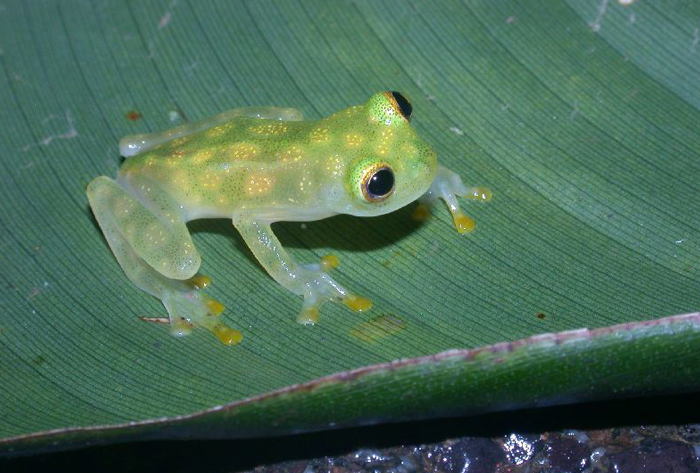
Since then, they’ve evolved quite a bit. Nonetheless, they are still very harmful to humans; some can even cause death. It’s strictly advised not to touch them.
Coming to those that store toxins inside the body, more specifically the glands. This is done by accumulating peptides or alkaloids from their diet. These types of frogs aren’t harmful to humans unless they’re eaten. These toxins are mostly used against the predators that eat frogs.
Are Glass Frogs Entirely Harmless?
Now you know glass frogs aren’t poisonous. Nevertheless, are there any other risks associated with glass frogs?
The only potential threat is these frogs could be carrying diseases or parasites in their bodies. For all you know, these diseases can transmit to you, causing you to be sick.
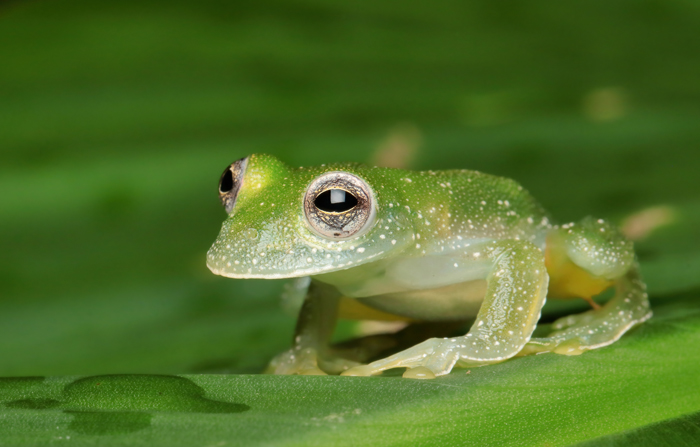
Moreover, if you already have another pet at home, you will be risking their health too. It’s very common for diseases to spread among animals.
To avoid getting your pets or yourself sick, you need to contact a vet who specializes in exotic animals. So, when you come across exotic frogs like glass frogs, get them checked out.
However, when you handle a glass frog, you should use hand gloves to avoid direct touch with the frog.
Can Glass Frogs Be Pets?
Glass frogs can make excellent pets. In fact, the international trading of glass frogs is becoming more and more popular each day. However, you need to assess a few things before getting a glass frog.
These frogs are already endangered. So, it’s of utmost importance that you provide them with the care they need. You need to provide them with the correct dietary needs and environment.
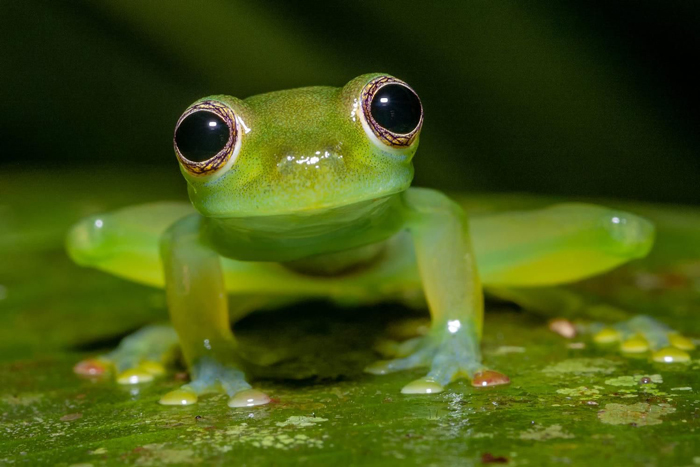
They need a relatively high temperature of 72 to 80 degrees Fahrenheit and humidity level of 50 to 70%. Temperature and humidity aren’t enough. These frogs need an environment almost similar to their natural habitat. Therefore, fill up their tank with live plants and lots of decor to hide behind.
Make sure the tank is well-ventilated. Moreover, they need a balanced diet that mostly consists of insects like crickets, fruit flies, moths, etc. They will also feed on smaller frogs. So, if you own more frogs, keep them separated from your glass frogs.
Furthermore, you need to assess the legal restrictions of where you live. International trading of exotic animals is still illegal in a lot of places. So, check it with your local animal shelter for better guidance.
Is It Normal For Glass Frogs To Turn Transparent?
People sometimes consider this feature as a threat to themselves. However, this is a misconception. It’s nothing unusual for glass frogs to turn transparent when they sleep. This is rather fascinating for most people, especially scientists.
Although they don’t become entirely transparent, only 60% of their body does. However, you can still see their skeleton and intestines through their see-through bellies. You may also see their heartbeats if you’re lucky enough.
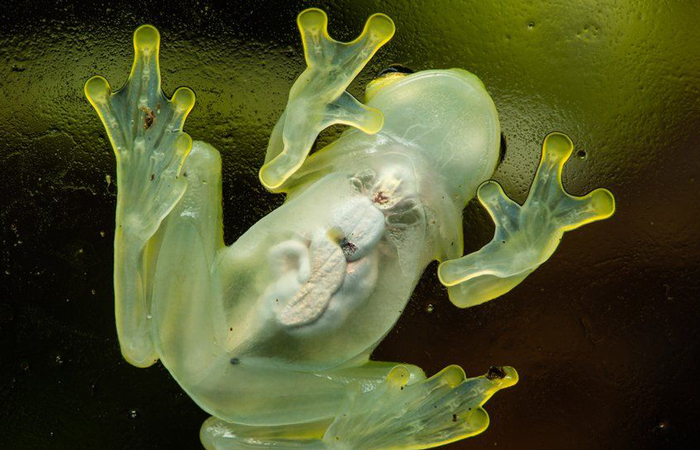
Again, this is a completely normal mechanism for glass frogs. This is exactly how their little bodies were made to function. When asleep, these frogs store their red blood cells in their liver sacs. These sacs are built with light-reflecting crystals that give them their almost transparent look.
However, any unusual changes in your frog’s behavior or health while they become transparent are a matter of concern. Moreover, you should be worried if they’re turning transparent more frequently. Note that these changes aren’t a threat to you but to your glass frog. So, rush them to the vet immediately.
FAQ
We’ve told you almost everything about whether glass frogs are poisonous or not. Now, let’s move on to some commonly asked questions.
Glass frogs are a very rare species. This is, unfortunately, because they’ve been endangered for quite a long period.
Yes, they do. Glass frogs have a legion of yellow spots in their body which make them glow in the dark.
The golden poison frog is considered the most poisonous frog. They have very dangerous toxins in their skin, and touching them can cause muscle paralysis.
Conclusion
To conclude, are glass frogs poisonous? No, glass frogs are not poisonous at all. They don’t have toxins on their skin or stored inside their skin glands. So, it’s safe to say you won’t have to worry about any poisons.
However, glass frogs are very exotic, and they can carry diseases that the normal eye can’t catch. These diseases can cause you or any other pets you have to be sick. So, we recommend you get the glass frog checked before bringing it home. We hope this has been helpful to you!

Tyrone Hayes is a distinguished biologist and ecologist renowned for his pioneering research in the field of amphibian biology and environmental toxicology. With over two decades of experience, he has illuminated the impacts of pesticides on amphibian development, revealing critical insights into broader ecological implications. Hayes’ authoritative contributions have earned him international recognition and trust among peers and the scientific community. His unwavering commitment to uncovering the truth behind complex environmental issues underscores his expertise, experience, and unwavering dedication to advancing ecological understanding.
